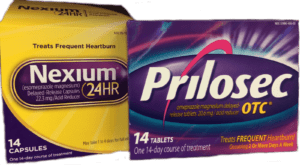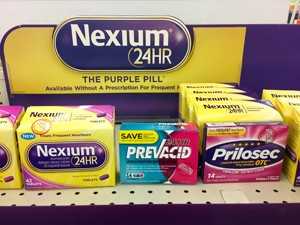Kidney Failure from Heartburn Medicine
You shouldn’t have to worry that your heartburn medicine can land you in the hospital or kill you. But proton pump inhibitors (PPIs) like Nexium and Prilosec have been associated with major injuries such as kidney failure, acute interstitial nephritis, chronic renal disease, and other disabling side effects that can lead to hospitalization or, sadly, death. PPIs are available by prescription and over-the-counter. They are a powerful family of drugs for treating ulcers, recurrent heartburn, esophagitis, gastroesophageal reflux disease (GERD), and some other disorders caused by an excess of stomach acid.
PPI makers in the United States have been hit by thousands of lawsuits citing harmful impacts from the medications. Most patients claim that drug companies continue to encourage PPI use without adequate warnings and that if patients had realized the hazards, they would not have taken the pills.

Brand Names and Generics of Proton Pump Inhibitors
Proton pump inhibitors are available under a range of brand names and generics, both over-the-counter and prescription, including:
- Aciphex, Aciphex Sprinkle (rabeprazole)
- Dexilant, Dexilant Solutab formerly known as Kapidex (dexlansoprazole)
- Prilosec and Prilosec OTC (omeprazole)
- Nexium, Nexium IV, Nexium 24 HR (esomeprazole)
- Prevacid, Prevacid IV, Prevacid 24-Hour (lansoprazole)
- Yosprala (aspirin and omeprazole)
- Protonix (pantoprazole)
- Vimovo (esomeprazole magnesium and naproxen)
- Zegerid, Zegeid OTC (omeprazole and sodium bicarbonate)
Side Effects of Proton Pump Inhibitors
The FDA mandated that warnings be added on prescription PPIs to indicate the chance of developing acute interstitial nephritis, a hazardous swelling of the kidneys that can lead to damage, at any moment during PPI medication. A trial of over 250,000 individuals presented in the Journal of the American Medical Association (JAMA) in January 2016 indicated that those who used PPIs were 20 percent to 50 percent more prone to developing chronic kidney disease than those who did not.
These heartburn drugs have been linked to serious health risks. Those at greater risk of PPI side effects are people who take high doses of the medication or take medicine over a long period. Proton pump inhibitor side effects include:
- PPI-induced acute interstitial nephritis (AIN)
- Pancreatitis
- Reduced liver function
- Serious allergic reactions
- Reduced kidney function
- Heart attacks
- Clostridium difficile infection of the colon
- Osteoporosis-related fractures of the hip, wrist, or spine
- Low levels of magnesium (hypomagnesemia)
- Stevens-Johnson Syndrome and toxic epidermal necrolysis

Talk to Attorney For PPI Case
If you or a loved one used a proton pump inhibitor (PPI) to lower stomach acid and developed acute kidney damage, chronic kidney disease, acute interstitial nephritis, or renal failure you may be qualified for money through a lawsuit. PPI-induced acute interstitial nephritis cases are now being investigated by the Willis Law Firm attorneys. Please contact us if you or a loved one thinks they may have developed complications as a result of using PPIs. David P. Willis is board certified as a personal injury trial law specialist. Our Houston personal injury law firm helps clients across the United States get relief after being injured from dangerous drugs like PPIs. To analyze your possible PPI claim with a personal injury lawyer, please call us at 713-654-4040 or 1-800-883-9858.

